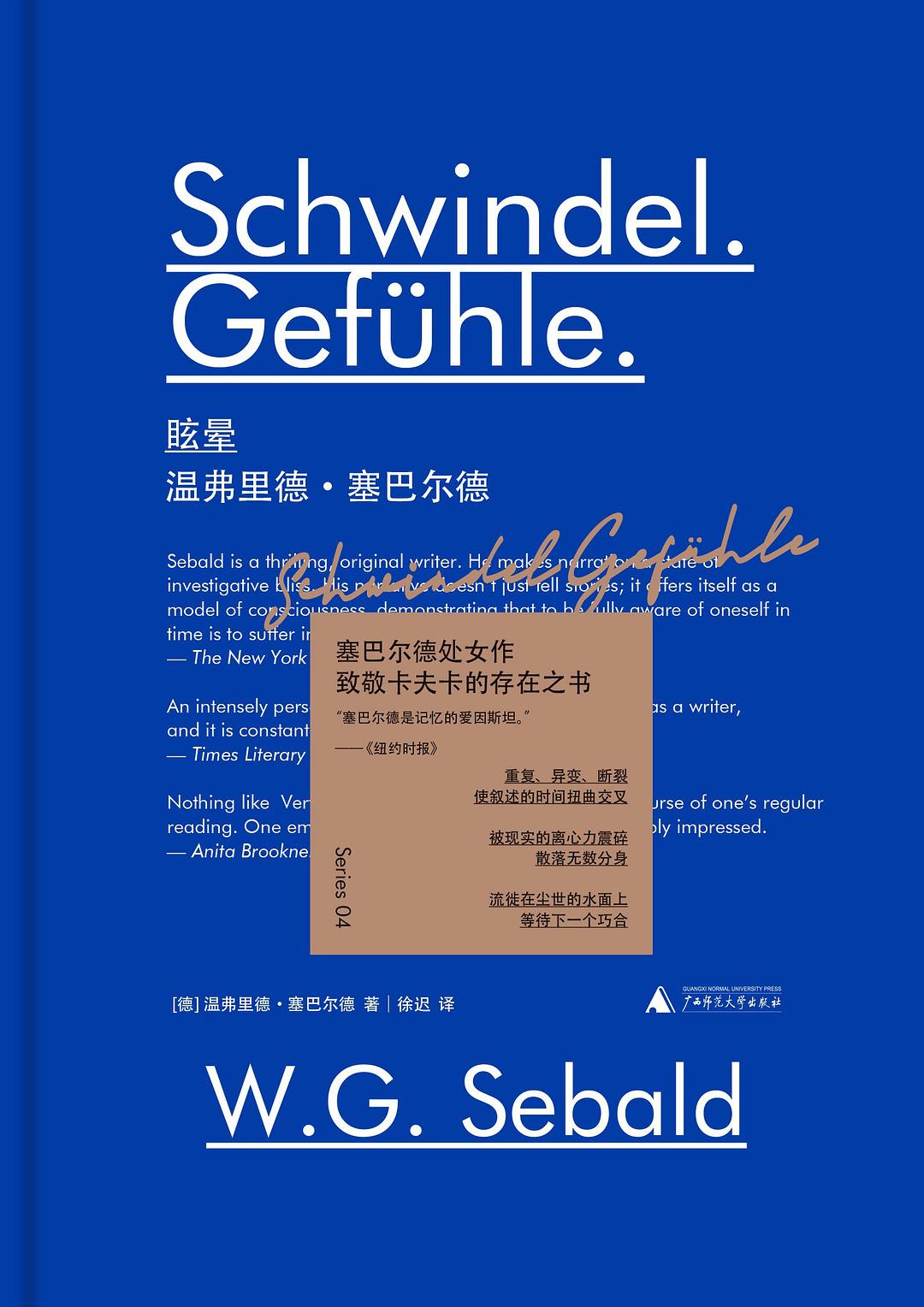1
/
of
1
dizziness
dizziness
[Germany] Winfried Sebald Xu Chi 译
Regular price
$15.99 USD
Regular price
$15.99 USD
Sale price
$15.99 USD
Unit price
/
per
Low stock
Couldn't load pickup availability
About Book
About Book
Schwindel. Gefühle.
【Content Introduction】This book is Sebald's debut novel, consisting of four chapters. The first chapter tells of Stendhal's military experience, his struggle with syphilis, and his fruitless love from his perspective; the second chapter tells of "I"'s travels to many places in Italy, or rather, the repeated escapes driven by anxiety; the third chapter tells of Kafka's business trip and balneotherapy trip to Italy in 1913; in the last chapter, "I" returns to my hometown in Germany to explore my childhood memories.
Each of the four parts revolves around a solitary narrator, who embarks on a bizarre and disturbing journey. During this journey, the "I" encounters various doppelgangers, stalkers, historical ghosts, and constantly encounters the mysterious hunter Grahus. He also vaguely shares similar fears and difficulties with Stendhal and Kafka from different times and spaces...
【Excellent Book Review】
This is a self-portrait of the soul—a restless, constantly dissatisfied soul, a tormented soul prone to hallucinations. —Susan Sontag Sebald is a thrilling and original writer. He makes narrative a state of exploratory ecstasy. —The New York Times Book Review
A deeply personal work that reveals the origins of Sebald's writing and continues to provide him with new stimulation and inspiration. - The Times Literary Supplement
One does not encounter a work like Vertigo in the course of ordinary reading. One comes away shaken, captivated, and deeply moved. —Anita Bruckner Sebald’s theme is memory, its resilience and its unreliability… He has made a great contribution to the fictional study of memory, starting with its decay, its feverish imagination, its creative wasteland. His persistent, seemingly random wanderings—from one country to another, from one encounter to the next—have a frantic precision. He records tiny conversations, meticulously describes the strangers who briefly travel with him, and provides maps and timetables. He seems to use writing to keep himself calm. —A.
S. Byatt【Editor's Recommendation】
1. Sebald's debut novel, the first to be published in Chinese: Susan Sontag praised it as "a self-portrait of the soul"; it was both an inexhaustible source of inspiration for Sebald and the origin of his novel style, and all subsequent works were its incarnations and rewrites.
2. The "Book of Being," which is closest to Sebald himself: a tribute to Kafka, with enigmatic characters from Kafka running throughout the book; departing from specific historical themes, focusing on the confrontation between the individual and memory, and through a consistent combination of reality and fiction, and the juxtaposition of text and images, writing about the grim nature of existence.
3. Vertigo and Deception: German title Schwindel
It refers to both vertigo and deception. Text filled with repetitions, coincidences, anomalies, and discontinuities distorts and intersects the narrative, hurling both "I" and the reader into an unknowable fourth dimension—memory—that the brain cannot process. This, perhaps, is the source of the vertigo. Unreliable memory disguises itself as order and regularity, creating the illusion that memory can grasp the past and foresee the future. However, history is never a whole, time is not continuous, and life has no paradigm or template to follow. Humans are trapped within the deception of memory, existing in a state of suspense.
4. Narrative Negative Space: While Sebald meticulously depicts travel landscapes, the technical details of painting and architecture, and the acute emotions of individuals, the central theme is a silence that grows increasingly profound through repeated expression—a constant motif in Sebald's work: untold truths, an unreconcilable past, and incomprehensible memories. Revolving around these inaccessible entities, the reader experiences a dizzying reading experience.
(Sebald’s writing has a quality of becoming more silent the more it speaks. The more detailed the details and the longer the sentences, the more solemn the book’s atmosphere and the quieter its voice. This is because his writing serves themes that cannot be told: truth, the past, and memory. Like a black and white positive and negative painting, the text constitutes the most conspicuous white part of the picture, while the subject falls into the untold shadow.)
5. The final novel in the Sebald series:
His debut novel, Vertigo, is the origin of Sebald's writing and a book of existence that blends memory, history, and myth.
His famous work "The Immigrants": a semi-fictional biography, four stories about Jews who left their homeland;
The classic work "The Rings of Saturn": an atypical travelogue, a memory museum spanning literature, art, social history, natural science and other fields;
His masterpiece "Austerlitz" is the epitome of Sebald's style. It covers a wide range of topics and combines Jewish history to explore more deeply the theme of "memory" that runs through Sebald's works.
Publication Date
Publication Date
2021-04-01
Publisher
Publisher
广西师范大学出版社
Imprint
Imprint
Xinmin said
Pages
Pages
216
ISBN
ISBN
9787559836281
share

